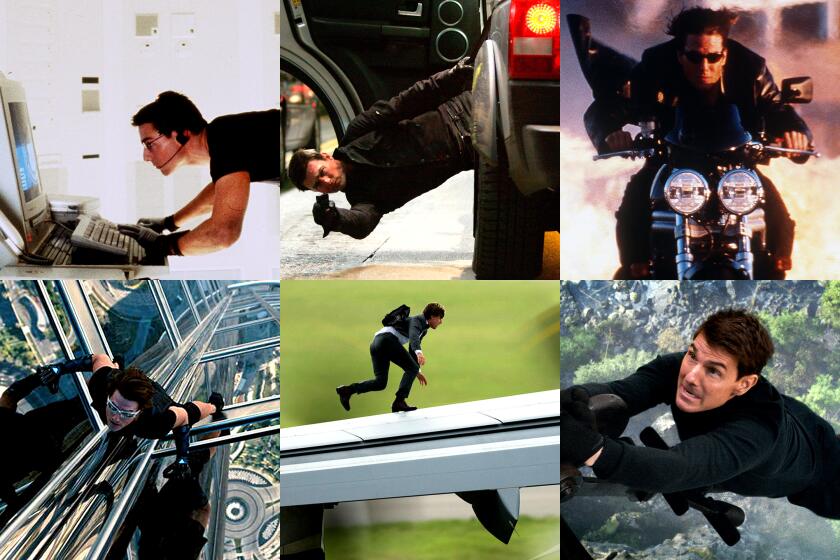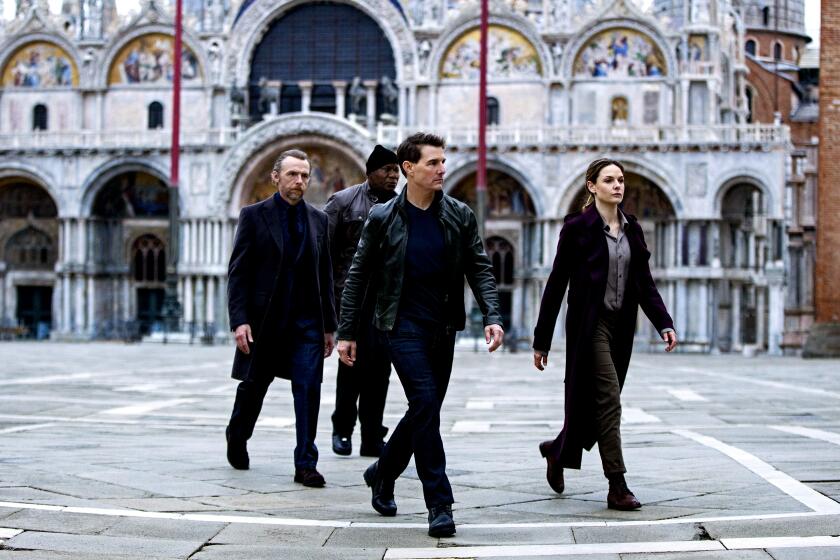The ending of the new ‘Mission: Impossible’ is a real train wreck. Just as they planned it
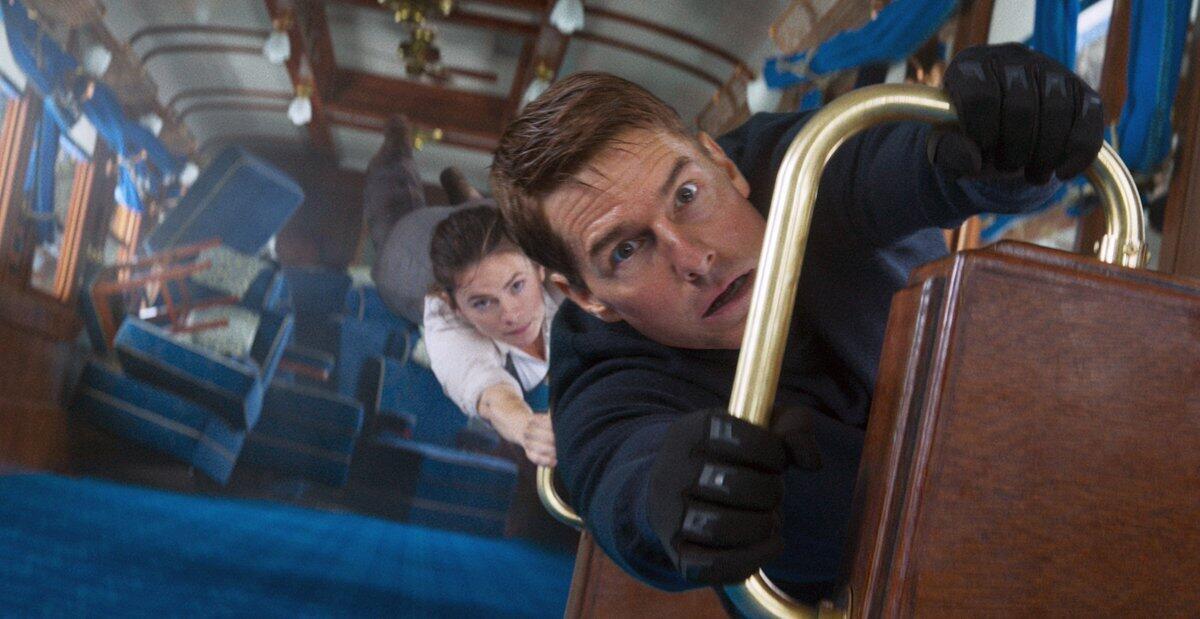
- Share via
“Tom [Cruise] said, ‘I want to drive a motorcycle off a cliff.’ And I said, ‘OK, I want to wreck a train,’” says “Mission: Impossible — Dead Reckoning Part One” director, co-writer and producer Christopher McQuarrie. “We’ll figure out what the emotional story is later for each character. These are the big action beats.”
So the production built a working replica of the luxurious Orient Express — three of them, actually — with the 70-ton locomotive’s ultimate destination being the bottom of a gorge. For the film’s gripping final sequence, the biggest in one of Hollywood‘s biggest action franchises, that spectacular crash is just the beginning.
“Watching it with an audience, I love it, because when the first carriage goes off the cliff, they give it a round of applause like they think that’s it,” says co-star Hayley Atwell in an interview conducted before the SAG-AFTRA strike. “My joy is knowing, ‘Oh, just you wait.’ ”
The extended conclusion finds tenacious spy Ethan Hunt (Cruise) and enigmatic thief Grace (Atwell) scrambling, climbing and jumping through cars as the train is slowly pulled over a wrecked bridge into a chasm. (Not a spoiler: It’s in the ads.) You could call the sequence a neat metaphorical trick too, with one of the movie’s themes being inevitability — it’s a word these villains are especially fond of — and our heroes caught on a literal runaway train.
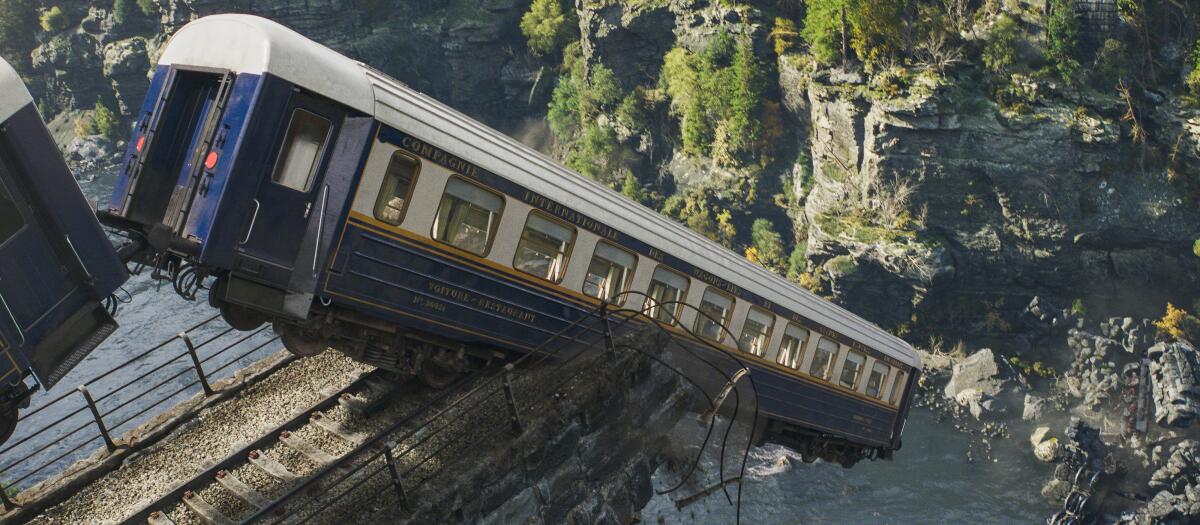
“Buster Keaton is obviously a big inspiration for ‘Mission: Impossible,’ and specifically Ethan Hunt,” McQuarrie says. “Charlie Chaplin, Harold Lloyd — we always go back to those silent films. ‘The General’ is a movie I really admire. There are great train wreck sequences in ‘Lawrence of Arabia’ and ‘Bridge on the River Kwai.’ So I knew trains were hugely challenging and wanted to take that on.
“I immediately regretted that choice,” he adds, laughing. “It was extremely difficult, time-consuming and limited based on where you could physically shoot it. Knowing this is ‘Mission: Impossible,’ it had to be practical.” (Meaning the production relied on actually performing physical stunts for the camera, rather than adding visual effects in post-production.)
McQuarrie acknowledges that train wrecks make for slam-bang finishes, but they’re something actors can’t realistically be involved in.
“So how do I make this more of a subjective event?” he says. “That’s when the idea of the train slowly going over and Ethan and Grace trying to navigate their way out of what is essentially a train wreck happening in slow motion came about,” he says. “The real challenge was getting the team to slow down. They’re all used to making big action sequences that are happening very quickly. I kept explaining, the actors are going to be fighting every square inch of the way. It’s a suspense sequence disguised as an action sequence.”
Tom Cruise’s secret agent Ethan Hunt is still taking on the bad guys of the ‘Mission: Impossible’ universe. Here’s how we reviewed each of the seven films.
Production designer Gary Freeman explains, “Basically, you were doing everything three times: You were dressing the real [train cars] on the location; you were building the dialogue-exposition ones on the stage; and then you were building the ones that went on the rigs. And they all had to match — they all were subtly different. Special effects built reinforced-steel versions because, obviously, everything had to be structurally secure.”
Sound designer James Mather says, “What is causing the train to keep spilling out over the edge of this canyon? It was the bridge falling apart. So the rumble and the crumble of rocks was a really important storyline to give the audience an understanding.”
Speaking in the same video chat with Freeman and Mather, cinematographer Fraser Taggart says he and gaffer Martin Smith built an external lighting rig for the scenes shot on a soundstage to simulate the perceived shifting of the sun around the moving train — which, in this case, wasn’t just driving horizontally on a track but tilting completely vertically into oblivion.
“The hardest thing in the world is to do natural lighting, to re-create what God gives,” Taggart says. “We shot lots of [test] footage on ordinary, modern trains, and not a lot happens. It’s a fine balance of going, ‘There’s got to be some movement there.’ ”
Speaking of movement, Taggart says the furniture falling as the cars turned on end created chaos: “It was hellish for all of us. We tried to do it with rigs and cables, with cameras on cables, but it lost the reality — it became a bit too mechanical. So we literally dangled our operator, Chunky [Jonathan “Chunky” Richmond], on wires amongst them. You’ve got to feel that you are another character in there. So we dangled Chunky with blood rushing to his head and spitting expletives, many expletives, which I think made it work.”
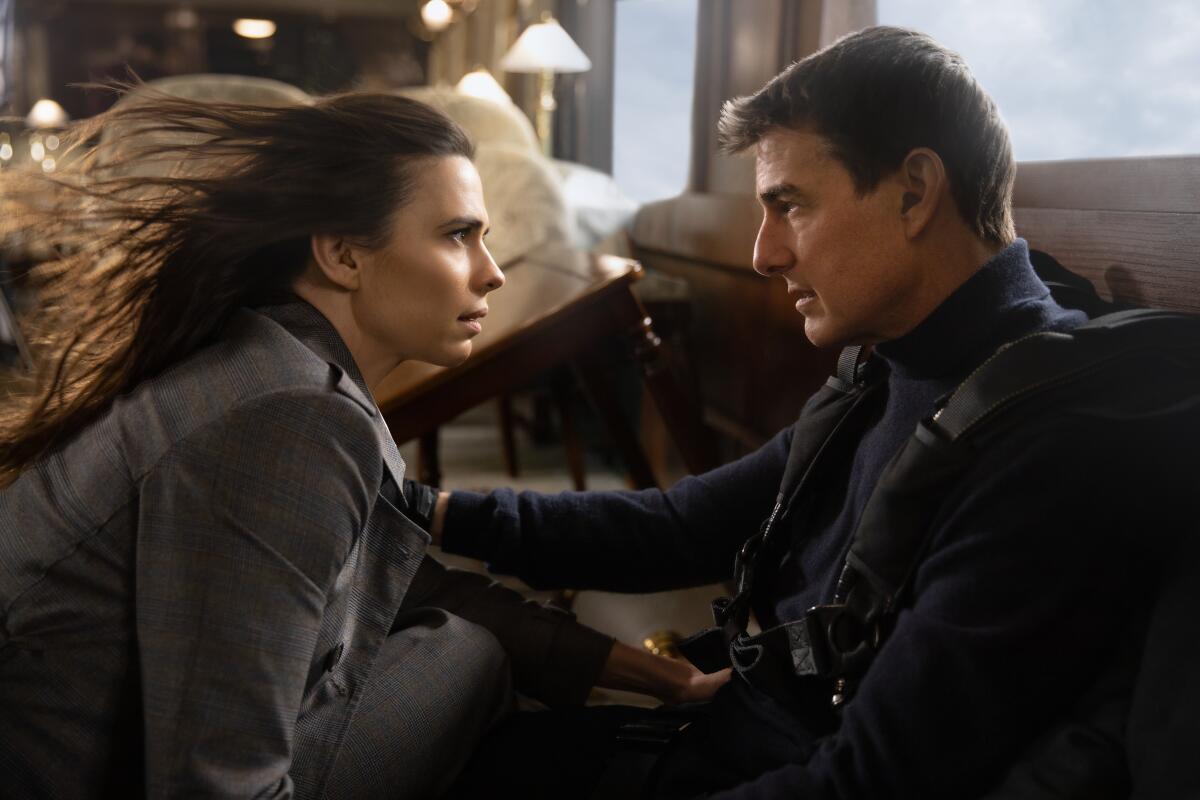
Hidden footholds and ‘unicorns’
“I’ve been in the business 26, 27 years, and I’ve never hung a train at 90 degrees and had someone climb up inside of it,” production designer Freeman says with a chuckle.
He describes a close collaboration among his team, Cruise and the director they’ve come to call “McQ.”
“We would build a proxy set and then the stunt guys would, obviously with Tom, work out what they needed. Then we would massage the design — maybe there was a little ledge that we would extend by three inches or something — just so he could get a foothold.
“Tom can only reach a certain distance. Hayley can only step a certain distance. Tom and McQ were very much in that mold, that it shouldn’t look superheroic. It should look real.”
Atwell credits the married couple of stunt coordinator Wade Eastwood and the film’s fitness instructor, Sam Eastwood (“a unicorn,” the actor calls her), with enabling her to “maintain the physicality Grace had in the movie.” Sam trained her to climb on rock walls in preparation for the sequence. Wade, meanwhile, apparently got the fun part.
“He took me to a racetrack and taught me how to drift,” Atwell says of the stunt-driving technique that oversteers a car sideways at high speed. “Tom, out of nowhere, came down [piloting] a helicopter behind the car on the racetrack. Wade went, ‘Oh, Tom’s here. He just wanted to see how you’re getting on. Just play with him.’ So he would come down low and chase the car and I’d drift around the corner and get away, and we’d be laughing, and I’d be like, ‘Oh, my God, this is amazing.’ ”
Atwell followed Cruise’s personal training program. “On set, he’s very protective,” she says. “He’ll kind of read what your face is conveying and give you what you need.”
Even when those needs include chocolate.
“There was a moment when he looked at me and was like, ‘Are you OK?’ He said, ‘You have adrenal fatigue. We’ve been working for so long on this train-carriage sequence. Do you need some chocolate?’ I was like, ‘Yes, of course. Chocolate all the time.’ And he produces a beautiful box of chocolate, seemingly out of nowhere.”
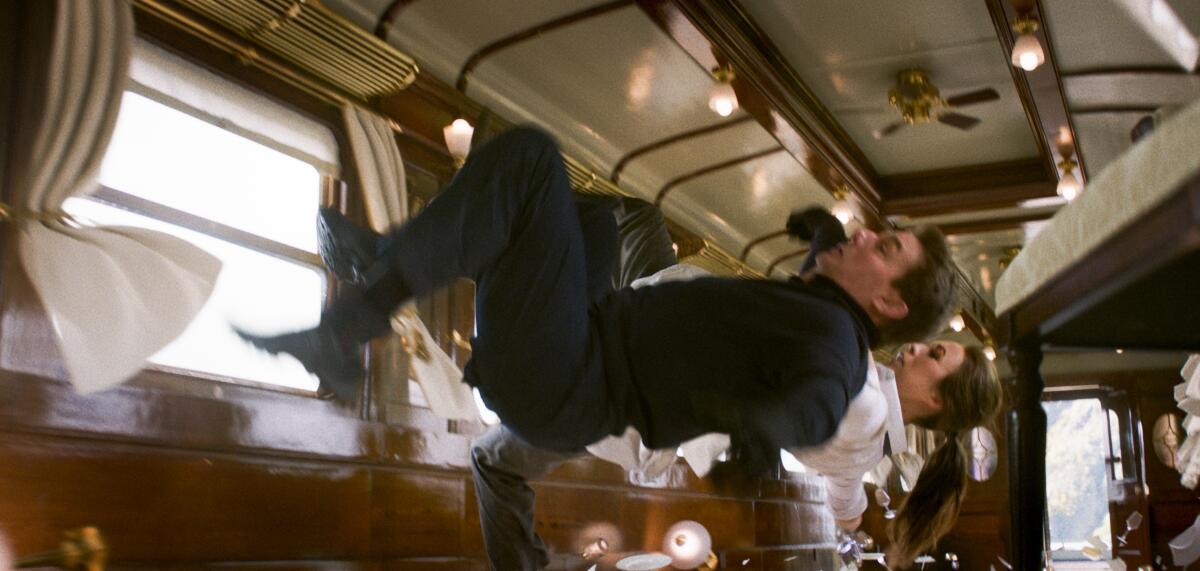
Emotional gravity and zero gravity
Sound designer Mather recalls, “Literally days before we shipped the movie, Tom was talking about the height. Tom’s always about: ‘I wanna feel this.’ So it had to have a moment of subtle, high-altitude wind whistle. It’s so brief and there’s so little time for it, but it gives you that kind of, ‘Ah, they’re really high.’”
Atwell remembers the cars being hoisted high, even on the soundstage. For an instant, Grace and Ethan experience zero gravity as the carriage they’re in suddenly drops. Atwell says they achieved it the old-fashioned way — by suddenly dropping the carriage. With them in it.
“We had a crash mat that was covered in a sheet, so it looked like it was just part of the scenery,” she explains. “You are harnessed in a way that if anything happens, it will catch your weight. But of course, you don’t want that to happen because you still bang into things and get bruised.”
But there’s more.
“When you see the train going from horizontal to vertical — that happens in about six seconds,” Atwell says. “So Tom and I would sprint on an incline and reach the bar to grab onto before we were vertically suspended. There was a lot of upper-body strength training I had to do to make sure I could hold my own weight for that long and grab hold of that bar in time.”
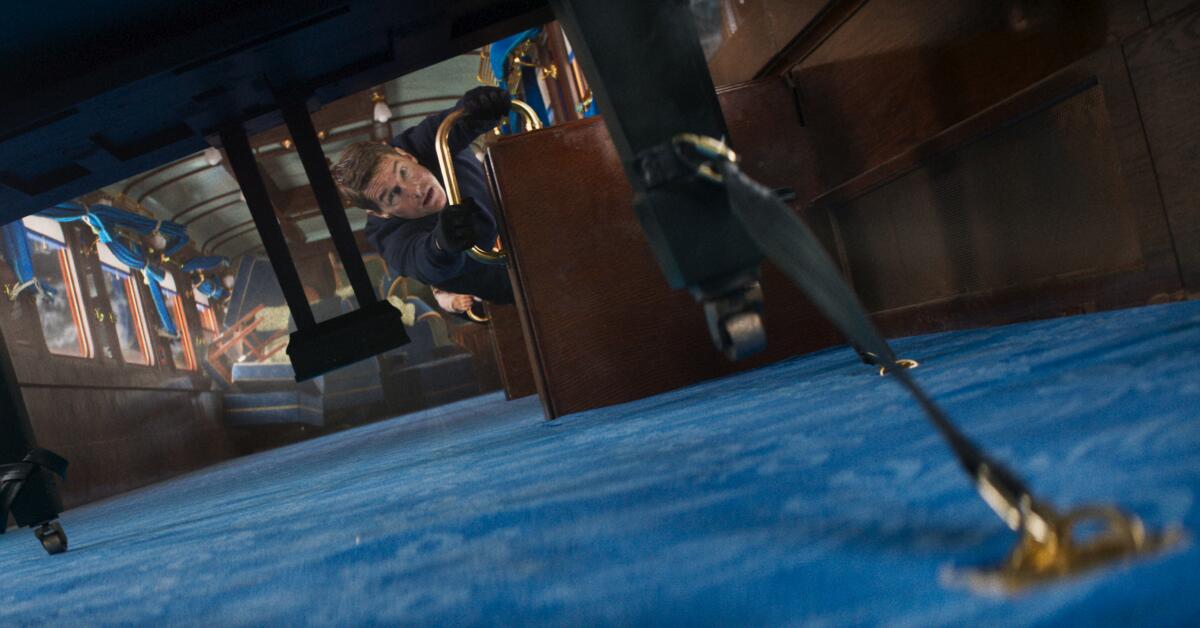
“After we’ve been hanging, Ethan jumps down onto this platform and I climb up to it,” she says. “We’re standing on this tiny platform together. Tom was like, ‘Don’t look down.’ I’m like, ‘Well, OK, I’m going to try not to,’ and I have to jump across this thing. I’m definitely aware of how high up we are — we can see treetops. We were way above the trees when we shot that.
“When Ethan asks me, ‘Do you trust me?’ and I sort of shake my head, that’s real. [But] I knew I was capable of doing it at that point, and it gave me the freedom to add more fear into the performance.”
McQuarrie says, “One of the biggest laughs in the movie is when he says, ‘Do you trust me?’ and Hayley just [shakes her head, wide-eyed]. That was found in the moment. Those are things you can’t write and plan for. You have to discover them. The performance Hayley gives in that moment kills me. Every time, I believe she’s not going to jump. Hayley is so profoundly empathetic. It’s why we spent 10 years trying to find the right thing for her.”
Tom Cruise re-teams with director-co-writer Christopher McQuarrie in the first of a two-part saga centered around a mysterious threat to human survival.
Atwell recalls, “Tom jumps across and says, ‘Jump, I’ll catch you,’ and the piano is falling, and they rigged it so the tiny platform I’m on starts to break. I never got used to that feeling. As soon as it starts to break, I have no choice but to jump across and aim for his arm, knowing he would catch me and hold my body weight if I secured my feet on the luggage rail. It’s such an edge-of-your-seat moment because you can feel my adrenaline there.”
For McQuarrie, that kind of emotional transparency is essential to any of this working. “It’s the thing that allows you to overlook the many hoops of logic that we’re asking you to jump through,” he says. “That’s what gets you invested in these sequences, the actors expressing to you how dangerous it is.”
Did it ever get too dangerous? Once or twice. Worse, McQuarrie had to cut the footage. At one point, Cruise and Atwell had to dodge falling furniture, which was impossible to do in a wholly controlled way.
“It was extremely dangerous,” the director admits. “It was the hairiest thing we’ve ever done because it was so chaotic and impossible to plan. And when I pulled those seconds out, the sequence flew. It was brutal to have to do it.”
Production designer Freeman remembers, “When the [engine] went over the edge, I was watching it live with the engineer, a guy called Colin Umpelby who built that whole rig. I palpably felt his fear because if he [messed up], that’s millions of dollars. I remember sitting next to him, and it landed pitch-perfect in the exact spot where it had been designed. I was so happy for him. The guy had the biggest smile on his face.”
Taggart adds, “It was like going to an amusement park every day.”
“Was it always amusing, though?” Mather asks. Their laugh is a sound made only by survivors.
More to Read
Only good movies
Get the Indie Focus newsletter, Mark Olsen's weekly guide to the world of cinema.
You may occasionally receive promotional content from the Los Angeles Times.
